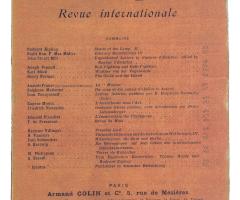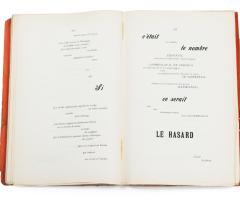Un coup de dés jamais n'abolira le hasard,
France: Cosmopolis. Revue Internationale, 1897
165 x 258 mm, pp.
Offset, thread binding
Cosmopolis Vol. VI. May, 1897. Nr 17 featured the first printed edition of UN COUP DE DÉS JAMAIS N'ABOLIRA LE HASARD on pages 417-427, including a 2-page preface by Mallarmé entitled OBSERVATION RELATIVE AU POÈME. The texts were preceded by writing of Anatole France and followed by letters by Ivan Tourgeneff, including no blank pages in any instance.
Wishing to be as eclectic in literature as in politics and to justify itself against the criticism that has been made of it, of misunderstanding the new French poetic school, the editorial staff of COSMOPOLIS offers its readers a previously unpublished poem by Stéphane Mallarmé, the undisputed master of symbolist poetry in France. In this work of an entirely new character, the poet has endeavored to make music with words as elements.
COSMOPOLIS editor's note
Mallarmé, who in the chrystalline structure of his certainly traditionalist writing saw the true image of what was to come, was in the COUP DE DÉS the first to incorporate the graphic tensions of the advertisements in the printed page.
Walter Benjamin One Way Street
"I would prefer that this Note was not read, or, skimmed, was forgotten; it tells the knowledgeable reader little that is beyond their own penetration: but may confuse the uninitiated, prior to their looking at the first words of the Poem, since the ensuing words, laid out as they are, lead on to the last, with no novelty except the spacing of the text. The 'blanks' indeed take on importance, at first glance; the versification demands them, as a surrounding silence, to the extent that a fragment, lyrical or of a few beats, occupies, in its midst, a third of the space of paper: I do not transgress the measure, only disperse it. The paper intervenes each time as an image, of itself, ends or begins once more, accepting a succession of others, and, since, as ever, it does nothing, of regular sonorous lines or verse – rather prismatic subdivisions of the Idea, the instant they appear, and as long as they last, in some precise intellectual performance, that is in variable positions, nearer to or further from the implicit guiding thread, because of the verisimilitude the text imposes.
The literary value, if I may say it, of this span of empty space on the page, which mentally separates groups of words or words themselves, is to periodically accelerate or slow the movement, the scansion, the sequence even, given one’s simultaneous view of the entirety of the page: the latter taken as unity, as elsewhere the Verse is or perfect line. Imagination flowers and vanishes, swiftly, following the flow of the writing, round the fragmentary stations of a capitalised phrase introduced by and extended from the title. Everything takes place, in sections, by supposition; narrative is avoided. In addition this use of the bare thought with its retreats, prolongations, and flights, by reason of its very design, for anyone wishing to read it aloud, results in a score. The variation in printed characters between the dominant motif, a secondary one and those adjacent, marks its importance for oral utterance and the scale, mid-way, at top or bottom of the page will show how the intonation rises or falls. (Only certain very bold instructions of mine, encroachments etc. forming the counterpoint to this prosody, a work which lacks precedent, have been left in a primitive state: not because I agree with being timid in my attempts; but because it is not for me, save by a special pagination or volume of my own, in a Periodical so courageous, gracious and accommodating as it shows itself to be to real freedom, to act too contrary to custom. I will have shown, in the Poem below, more than a sketch, a 'state' which yet does not entirely break with tradition; will have furthered its presentation in many ways too, without offending anyone; sufficing to open a few eyes. Today, without presuming anything about what will emerge from this in future, nothing, or almost a new art, let us readily accept that the tentative participates, with the unforeseen, in the pursuit, specific and dear to our time, of free verse and the prose poem. Their meeting takes place under an influence, alien I know, that of Music heard in concert; one finds there several techniques that seem to me to belong to Literature, I reclaim them. The genre, which is becoming one, like the symphony, little by little, alongside personal poetry, leaves intact the older verse; for which I maintain my worship, and to which I attribute the empire of passion and dreams, though this may be the preferred means (as follows) of dealing with subjects of pure and complex imagination or intellect: which there is no remaining justification for excluding from Poetry – the unique source."
Stéphane Mallarmé in the PREFACE

